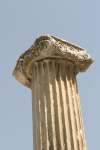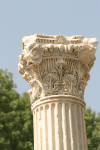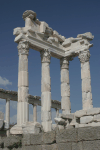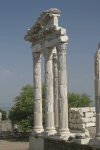
Roman Bazaar Street leading to the Asclepion. (691k)
This city goes back to Trojan times. It prospered under Lysimachus, one of Alexander the Great's generals, when he secured the treasures that he collected during the fighting over the succession of Alexander the Great in Pergamum. Pergamum is a UNESCO World Heritage Site.
Attalus I (241 BCE - 197 BCE) declared himself king of Pergamum, expanded its power and made an alliance with Rome. During the reign of Eumenes II, his son, Pergamum was at its most powerful. Eumenes II added the library and the Altar of Zeus to the Acropolis. He also expanded the Asclepeion. This library is said to have held 200,000 volumes, it was a symbol for Pergamum's prosperity and social status. The Egyptians, afraid that this library would detract from the library in Alexandria, cut of the supply of Papyrus to Pergamum. Eumenes II tasked his scientists to replace it, and they invented pergamen (the Latin word for parchment), a writing surface made from animal hides instead of from papyrus reeds.
Eumenes I's son Attalus II kept Pergamum powerful and prosperous. Under his son, Attalus III, the kingdom deteriorated. Since Attalus III didn't have a son, he willed the kingdom to Rome. In 129 BCE, Pergamum became the Roman province of Asia Minor.
The famous Pergamum Altar is now in the Pergamon Museum in Berlin in Germany.
All pictures are © Dr. Günther Eichhorn, unless otherwise noted.
The Asclepion was an ancient medical center, founded by Archias, a citizen of Pergamum, who was cured at the Asclepion of Epidaurus in Greece.
The Asclepion came to prominence under Galen (131 - 210), who was born in Pergamum, studied in Alexandria, Greece, and Asia Minor. He systematized medical theory and added considerable knowledge in various aspects of medicine. He is recognized as perhaps the greatest early physician. His work was the basis for Western medicine into the 16th century.








The Acropolis on top of the hill over Pergamum is a beautiful place from the 3rd century BCE. The theater is unusual, it is very high and steep, different from other Greek theaters, to fit into the mountain. It can hold 10,000 spectators, but only if you don't have acrophobia.
The marble columns of the Temple of Trajan are spectacular. This temple was built during the reigns of the emperors Trajan and Hadrian, and used to worship them as well as Zeus.







This page contains 15 pictures

Main page for Türkiye Cumhurieti (Turkey)
Page last updated on Thu Mar 18 10:29:53 2021 (Mountain Standard Time)